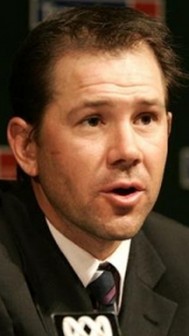MELBOURNE, (Reuters) – In a defiant captain’s swansong, Ricky Ponting hit a fighting century in a losing cause as Australia bowed out of the World Cup earlier this year and then spoke of his hopes for a “Tendulkar-like” re-birth.

Nine months later, the gritty Tasmanian is still gazing at the horizon, waiting for a new dawn that has stubbornly refused to break.
In Australia’s four-test series against India starting Dec. 26, Ponting will face off once again with the man he desperately wants to emulate.
Former captains alike and the most prolific run-scorers of all time in tests and one-dayers, Ponting and Sachin Tendulkar are still two of the brightest stars in cricket’s firmament.
They head into the Boxing Day test at the Melbourne Cricket Ground both desperate for a century but for very different reasons.
Tendulkar, afforded God-like status in a nation of a billion people, needs one more to complete his 100th international century, a near-mythical landmark that many doubt will ever be eclipsed.
Ponting, who stepped down from the captaincy in March and turned 37 on Monday, needs a first test ton in nearly two years merely to save his career.
Each have had their chances, with Tendulkar especially tantalising as he reached 94 in the third test against the West Indies in Mumbai last month before nicking an edge to the slips.
The 38-year-old also threatened with a 76 in the first West Indies test following a 91 in the fourth test against England at the Oval in August.
He arrives in Australia still near the peak of his powers, having amassed 651 runs in eight tests for an average of 46.50 this year.
Ponting, conversely, is a shadow of his former dominant self. Two half-centuries in his last four tests have lifted his average to a paltry 24.84 for the past year.
Ponting’s recent dismissals, flailing across the crease with the ball invariably cannoning into his pads, have been seen as an indication of a man no longer the master of his technique, let alone the match of the world’s best bowlers. With debate raging about his place in the team, his captain Michael Clarke has backed him to follow Tendulkar into his own Indian summer – as soon as that elusive third digit again appears next to his name on the scoreboard. “Once he makes that score, he’ll go on like Sachin and the next few years of his career could be his best,” Clarke said before Australia’s tour of South Africa last month.
“Ricky’s a huge help to a lot of the young guys in our group, passing on experience and knowledge. I still do a lot of work with him on my batting,” he said. Ponting and Tendulkar’s will undoubtedly loom large in cricket long after they bow out of the game but their careers may be viewed quite differently.
Tendulkar’s legend was born when the curly-haired 16-year-old defiantly batted on with a blood-stained shirt after being struck in the mouth by a Waqar Younis delivery during his 1989 debut in Pakistan.
His aura only grew from there as he racked up century after century with an effortless grace that Don Bradman remarked was similar to his own.
Ponting hammered 96 on debut as a 20-year-old against Sri Lanka, and his fiercely competitive nature and front-foot aggression has propelled him to 39 test centuries and 42 test wins as captain, the most ever.
Moulded in a succession of ruthless teams bound by a culture of winning, the belligerent Tasmanian remains a figure of respect rather than adulation in Australia.
The public is unlikely ever to forgive or forget his crime of captaining the team to a third Ashes series loss earlier this year, and a protracted departure will not help.
“It is a tough thing to decide when it is the end,” former Australia skipper Greg Chappell told local radio this week. “The players of Ricky Ponting’s calibre are rare and it is better to give them one game or one series too many than one game or one series too few because there aren’t that many that can replace them.
“There does come a point – and I don’t want to make a comment one way or another about Ricky’s stage – where there is a diminishing return on the investment and the decision has to be taken as to whether there is somebody else who can do as well at the moment but has a chance to get better.”








